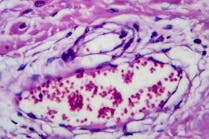Merck, known as MSD outside the United States and Canada, and Eisai announced that the U.S. Food and Drug Administration (FDA) has approved the combination of KEYTRUDA, Merck’s anti-PD-1 therapy, plus LENVIMA, the orally available multiple receptor tyrosine kinase inhibitor discovered by Eisai, for the first-line treatment of adult patients with advanced renal cell carcinoma (RCC).
Merck said the approval is based on results from the pivotal Phase 3 CLEAR (Study 307)/KEYNOTE-581 trial, in which KEYTRUDA plus LENVIMA demonstrated statistically significant improvements versus sunitinib in progression-free survival (PFS), overall survival (OS) and confirmed objective response rate (ORR).
For PFS, KEYTRUDA plus LENVIMA reduced the risk of disease progression or death by 61% with a median PFS of 23.9 months versus 9.2 months for sunitinib. For OS, KEYTRUDA plus LENVIMA reduced the risk of death by 34% versus sunitinib. Additionally, the confirmed ORR was 71% for patients who received KEYTRUDA plus LENVIMA versus 36% with sunitinib. KEYTRUDA plus LENVIMA achieved a complete response (CR) rate of 16% and partial response (PR) rate of 55% versus a CR rate of 4% and a PR rate of 32% for those who received sunitinib.
Patients were randomized (1:1:1) to one of the following treatment arms: LENVIMA (20 mg orally once daily) in combination with KEYTRUDA (200 mg intravenously [IV] every three weeks for up to 24 months); LENVIMA (18 mg orally once daily) in combination with everolimus (5 mg orally once daily); or Sunitinib (50 mg orally once daily for four weeks on treatment, followed by two weeks off treatment).





